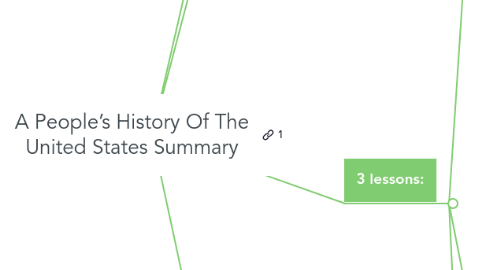
1. 1-Sentence-Summary:
1.1. A People’s History Of The United States will help you improve the world by giving you a better understanding of the true, sometimes shameful, story of this America’s rise to power.
2. Favorite quote from the author:
2.1. "The memory of oppressed people is one thing that cannot be taken away, and for such people, with such memories, revolt is always an inch below the surface." - Howard Zinn
3. 3 lessons:
3.1. Wealthy landowners set up the US government to benefit their interests, and they continue to rule today.
3.1.1. In the past, historians have falsely claimed that African people who were brought to America were naturally submissive. But the real truth is that they did try to revolt, and many died for this.
3.1.2. Slave owners knew that they had to crush their spirits if they could successfully keep slaves.
3.1.3. However, the biggest fear these early settlers had was that the slaves and lower-class whites would join together and attempt to overthrow the rich property owners.
3.1.3.1. At the time, about half of the people who were coming to America were white servants, so the groups posed a significant threat.
3.1.3.2. This was the real reason a law was passed making it illegal for white and black people from speaking.
3.1.4. By the year 1770, the top 1 percent was in control of 44 percent of the nation’s wealth. This unfair distribution of wealth still exists today, thanks to the founding fathers.
3.1.5. American leaders like George Washington, Thomas Jefferson, and Alexander Hamilton were all very wealthy landowners
3.1.5.1. Some of them actually owned large slave plantations.
3.1.5.2. Naturally, the government they established was in favor of maintaining their own wealth.
3.1.5.3. This is why most of the US Constitution focuses on protecting those who own land but mentions nothing of women, slaves, servants, or those without property.
3.1.6. Laws like needing to own property with at least a value of 5,000 pounds ensured that the power stayed with the wealthier Americans.
3.2. Political leaders were more concerned about their own interests than ending slavery at the start of the Civil War.
3.2.1. We’d like to think of the Civil War as the heroic plight of the altruistic North freeing the slaves. But in reality, things might be a little less valiant.
3.2.1.1. Tensions brewed between the North and South because the North was elite businessmen and manufacturers who wanted a free market and high tariffs that would protect against competition.
3.2.1.2. This plan was not in the interest of the Southern plantation owners, and the South was angry they were unsympathetic to their needs. So they seceded from the Union.
3.2.2. Lincoln waged the war that ended slavery, but it wasn’t for the sake of humanitarianism or justice.
3.2.2.1. He just wanted to do everything he could to keep the Union financially healthy and please his political supporters.
3.2.3. Though the Emancipation Proclamation is often hailed as a wonderful act of humanitarianism, this isn’t really the whole picture.
3.2.3.1. What it really said is that those who are opposed to the Union could not have slaves.
3.2.3.2. This was only to strategically get slaves to leave their plantations, forcing the South to surrender.
3.2.4. After the war, the Union gave the plantation owners compensation for losing their slaves.
3.2.4.1. The freed slaves, however, were left on their own as new forms of racial oppression emerged, mostly without protection.
3.3. Economic gains were a primary reason for the United States entering World War II, and have been for many military actions of the country.
3.3.1. Franklin D. Roosevelt wasn’t focusing on dictators and racism as much as we think.
3.3.2. His primary concern was how war would affect resources the US depended on, particularly from Japan.
3.3.2.1. After trade was becoming affected by the War, the US began to place heavy sanctions on them. Just two weeks before Pearl Harbor, the White House held a meeting trying to justify starting a war with Japan.
3.3.2.2. They knew the US economy would benefit from the the War and open up foreign markets. Oil in the Middle East is just one example.
3.3.2.3. But a small group of businessmen benefited most. Of the 2,000 companies who submitted bids for military contracts, only 56 large corporations got them, and they saw their profits skyrocket.
3.3.3. General Motors president Charles Wilson suggested we have a “permanent war economy” and that’s exactly what happened.
3.3.3.1. After the War, military budgets remained at those high levels, and were justified by threats of everything from communism to Vietnam.
